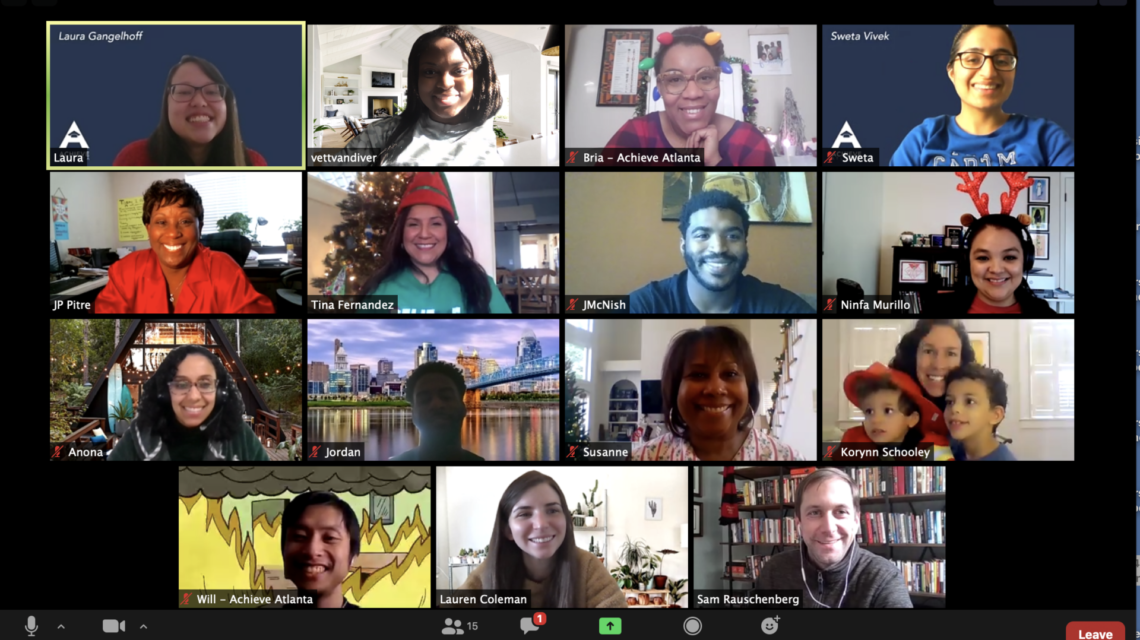The Continuing Challenges of Online Learning

“These are unprecedented times”
“Due to COVID-19”
“You’re invited to a ZOOM [party, baby shower, meeting, gender reveal, fundraiser]”
“Self-care, staycation, social-distance”
“You’re muted.”
“Ma’am, only two [bottles of Lysol, packs of toilet paper, bottles of hand sanitizer]”
“Maaaamaaaaa!”
These were just a few of the answers to a recent prompt in our Achieve Atlanta staff meeting: Share the most annoying phrases of 2020.
Once we got going, it was hard to stop and we had a good laugh. But the one phrase we all agreed was the most annoying was, “There will be a new normal.”
We don’t want the old normal or a new normal. We don’t want to settle into what is usual, average, or typical for the students we serve. We want exceptional, amazing, and extraordinary support, schooling, and opportunity for the generation of students who have shown anything but normal resilience, determination, and fight in 2020.
Our Scholars are wrapping up another semester, and most of them have taken classes almost entirely online throughout 2020. While they have done everything they can to stay on track, they know firsthand that the best learning doesn’t happen in an online vacuum. In a recent survey conducted by Top Hat Field Report, nearly 65% of college undergraduates said they are not learning as effectively online as they would have in person.
This shouldn’t be surprising. Whatever level of school they’re in, students need more than just the delivery of content to gain an education. Whatever they are learning, students must meaningfully engage with their instructor and their peers, and then apply that information in a real-world context.
Despite the best efforts of teachers and professors, Zoom school has stripped away too many of the critical components of getting an education. Perhaps that’s why only 32% of undergraduates find the online learning experience engaging outside of the classroom and just 46% are able to stay motivated and engaged with their education and coursework outside of class time.
Students don’t need more of the same. They need better. And while higher education continues to play a role in helping students learn and prepare for the workforce, it must also accelerate the pace and efficacy with which it employs new tools and techniques to enable long-lasting learning to happen.
Online learning has its place and it’s likely here to stay. Now’s the time to double-down on the best tools and techniques it has to offer for engaging students. The bright spots of online learning include:
- The right tools increase communication with instructors and peers. Undergraduates who were provided with tools beyond email to engage with their teachers and peers outside of class times said they are significantly more motivated and engaged with learning.
- New technologies and techniques can promote discussion and collaboration. When instructors make small changes that promote discussion and get students interacting, working, and collaborating together, students say they are more engaged with their learning and feel their education is more valuable.
- Instructors are learning how to build community in virtual classrooms. By taking the time to understand students’ backgrounds, check in to see how they are doing and provide timely feedback, teachers connect with students and connect them with the course, the material, the virtual classroom, each other, and their educational institution. Students who feel their instructor has fostered a sense of belonging are more likely to stay motivated and engaged with coursework; they also are more likely to say they’re learning effectively and that their educational investment is valuable.
At Achieve Atlanta, we’re also trying to use the technology available to us to engage with our Scholars and help them build community with each other. If 2020 taught us anything, it’s that engagement, connection, and belonging are critical for humans to thrive.
Let’s resolve to make 2021 the year we do the extraordinary: put our students and their education first, so that the next time we face an “unprecedented” crisis, they are more than prepared to lead us through it. Farewell 2020.
